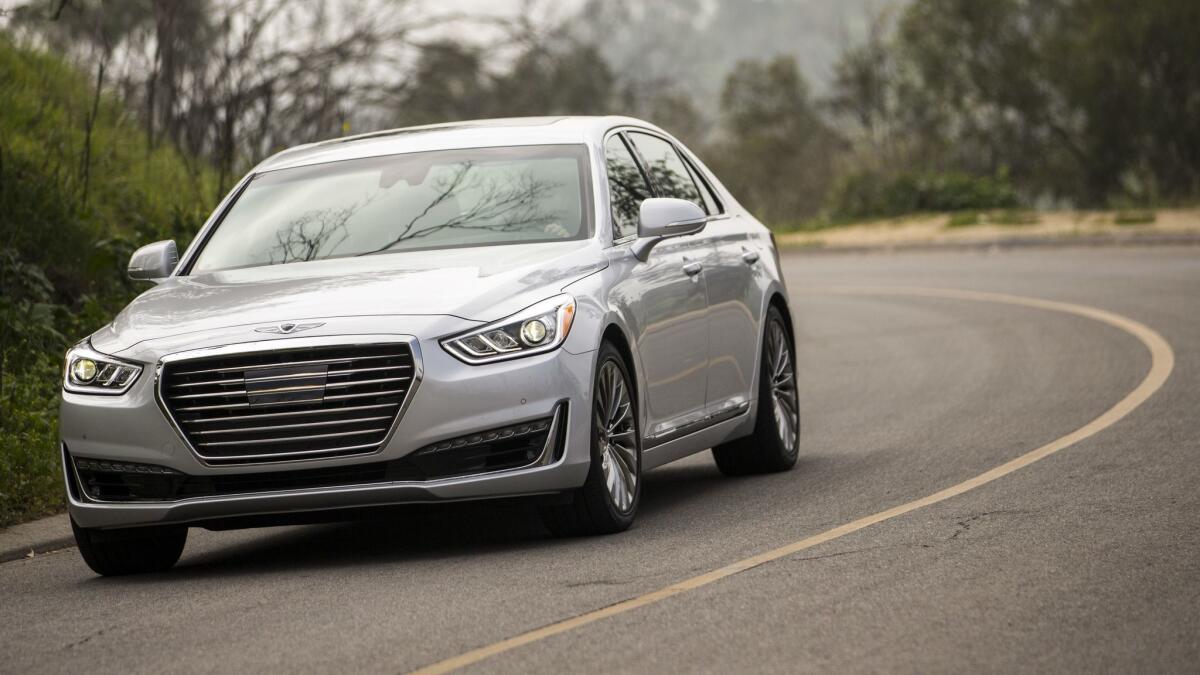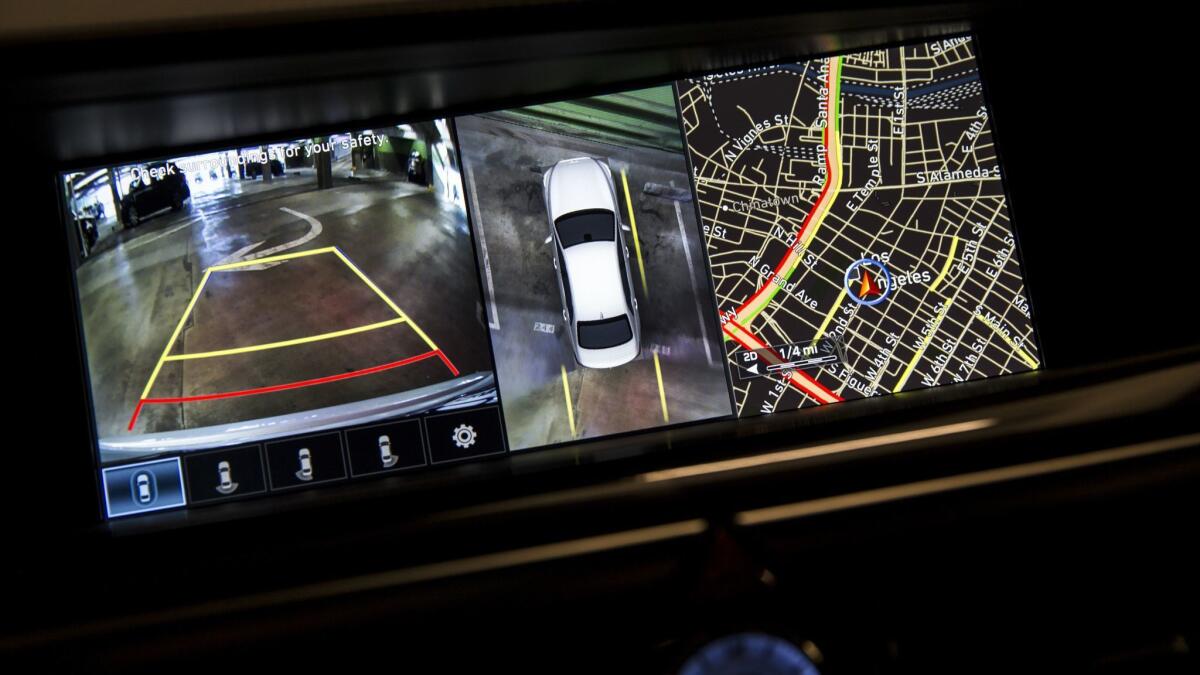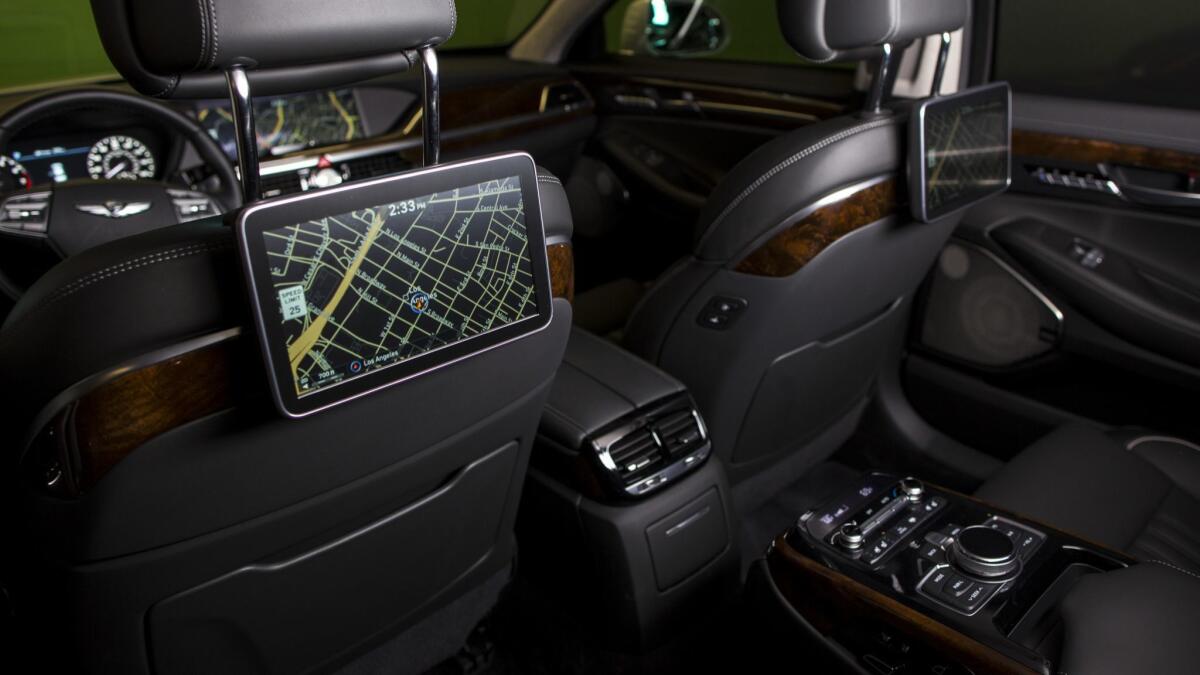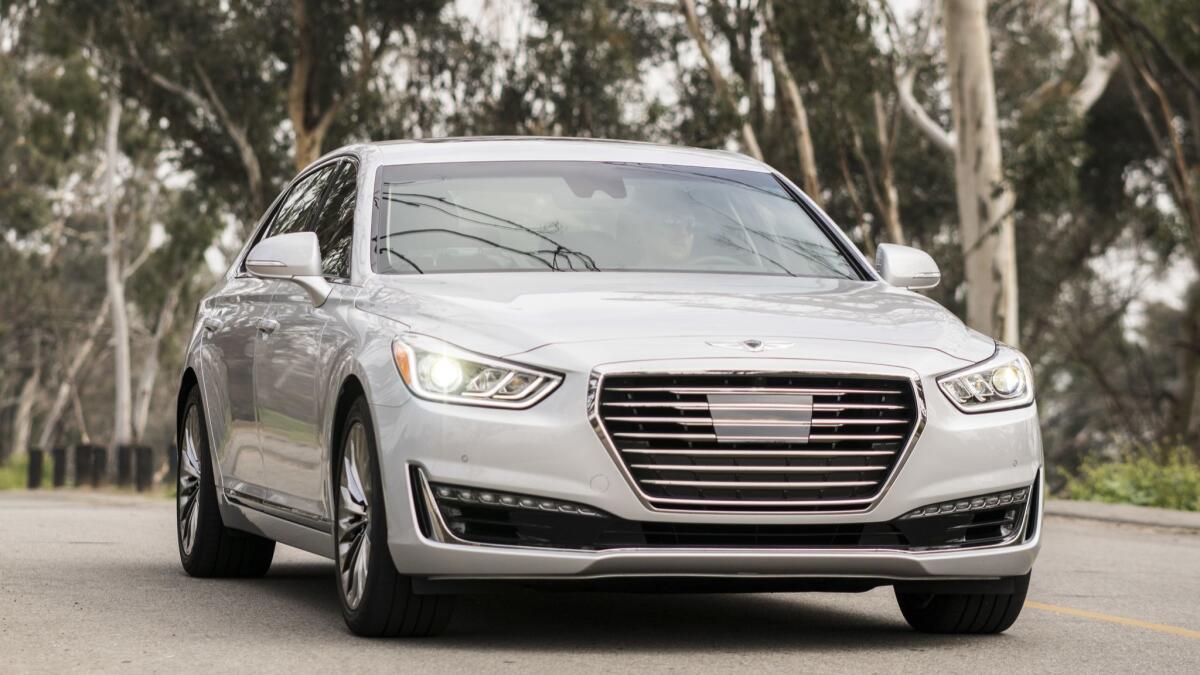The Genesis G90 is a luxurious opening act for the new brand — and definitely not a Hyundai

- Share via
The first thing you need to know about the Genesis G90 luxury sedan is that it’s definitely not a Hyundai. Even though it’s made by Hyundai Motor Group.
Genesis is the new, high-end brand from the South Korean auto conglomerate, which has been careful to distinguish the luxury division from its more affordable Hyundai and Kia lines of sedans and SUVs. The full-size G90 is the nameplate’s flagship vehicle, a stately ride that tops out around $75,000 and comes loaded with luxury and technology features you won’t find in an Elantra.
And if, by mistake, you call the G90 a Hyundai in conversation with Erwin Raphael, Genesis’ general manager in the U.S., he will correct you. He noted my gaffe, at least.
I sensed Raphael was accustomed to this. He took it in stride, breezily pointing out the inaccuracy — but it felt as though he couldn’t let the error slide. I imagine others could make the same mistake, and not because the G90 seems economical, but simply because the Genesis brand is only 2 years old.
And that’s part of Genesis’ challenge: to educate consumers about its existence, while keeping a safe distance from Hyundai and the residue of unreliability that clings to the marque, which entered the stateside market in 1986 with cars plagued by quality issues.
Those problems were dealt with years ago — aided by Hyundai famously offering a 10-year/100,000-mile powertrain warranty — and now the company is known for producing well-made and dependable vehicles.
But just a whiff of shoddiness, even if it is by association, could taint the rollout of a brand that’s asking consumers to drop Mercedes-Benz money on a car from Korea, which never before has sent such a pricey car to America and whose cars have yet to attain the prestige of European and Japanese rivals.
In a way, Genesis is attempting to accomplish what Lexus did in the early 1990s, when the Toyota Motor Corp.-owned company upended the U.S. luxury car market with its LS400 sedan.
That car, which bowed in 1989, was priced well below its competitors and offered Japanese reliability alongside new features such as an automatic tilt-and-telescoping steering wheel and power-adjustable seat belts. These doodads may seem quaint now, but the LS400 stood out and quickly outsold many rivals.
In the G90, Genesis has an effective opening offering in the luxury marketplace — one that is less expensive than most of its entrenched competitors while including many of the same advanced features found in those rides, some of which have been playing in this moneyed space for decades.
Approaching our test vehicle, a 2018 G90 5.0 Ultimate edition that cost $72,825, I was struck by this: It certainly looks credible. The sedan has a kind of muscular grace, which is most effective at the rear, where its high belt line, brawny haunches and swooping, vertical taillights mesh nicely.
Inside, there are ribbons of wood and chromed surfaces, and lots of technology — such as a 12.3-inch screen that displays all manner of information, including a 360-degree exterior view of the car that’s beamed from an array of cameras. It makes parking in tight spaces a cinch.

Behind the wheel, the rear-wheel drive G90 is refined, equally comfortable on L.A.’s scarred city streets and freeways. The distinguishing element of the Ultimate version is its V-8 motor, which generates 420 horsepower and propels the car to 60 mph in an estimated 5.3 seconds.
The car is faster than it needs to be. And yet, even at speed, it’s impressively quiet inside the cabin. A sharp stab of the throttle does generate some noise indicating there is internal combustion happening somewhere in the vicinity, but the experience is otherwise entirely serene.
There are, however, areas where the car is a letdown, allowing the down-market anxieties to fester. The issues in our test vehicle were small — a flimsy glove box door that did not open smoothly, and plastic door lock/unlock buttons that seemed fit for a car one-third of the price — but I noticed them.
In some respects, the G90 feels like it is trying too hard. As with some other cars — including far less expensive ones, like the Chevrolet Volt — the G90 plays a short musical theme over its stereo system upon powering the vehicle on and off. In the G90, slightly different tunes are played at the beginning and end of a journey, and the piano-focused pieces seem to be an attempt to evoke luxury.
But I’m not a music critic, so I asked a friend, Michael Wells, the choral director of the Silver Lake Chorus, to listen to the four-second introductory composition and offer his thoughts.
“The harmonic progression begins with an arpeggiated inverted minor chord that shifts to a major chord, giving an uplifting feeling. It’s refreshing, but doesn’t fully resolve as a musical phrase, such that you are left wondering what’s next, which in this case is whatever your journey is going to be,” he said. “The idea of having a musical greeting — it’s like a fanfare in medieval times for a king.”
If arpeggiated inverted minor chords aren’t your thing, the musical function can be turned off.

When the Lexus LS400 debuted nearly 30 years ago, it was knocked for aping some of the design and engineering elements of competing vehicles like the Mercedes-Benz S-Class, whose uncompromising — albeit stolid — approach to luxury has made it an industry leader for years. Now, the G90 is the latest luxury interloper, and this time it’s the Lexus LS (among others) that looks to be the subject of some mimicry.
I asked Raphael about the issue of imitation. He pushed back, even as I noted that, for starters, the Genesis logo looks a lot like Bentley’s winged emblem.
“If you thought about it, you could probably come up with four or five car brands with wings,” he suggested. (I couldn’t.)
More to the point, I asked Raphael about the styling similarities between the G90 and other cars. “We certainly don’t benchmark — we don’t even like using the word,” he replied. “If somebody sees a line or a light or a handle that looks like another car, I don’t really take much from it.”
Still, I wanted to get some seat time in the new-for-2018 Lexus LS500 for the sake of comparison.
The base LS500 starts at $76,219, which is within range of a G90 Ultimate optioned with all-wheel drive. But it was tough to make an apples-to-apple comparison with the LS that Lexus loaned me — an options-laden hybrid version that cost nearly $105,000. (Among the niceties were surprisingly effective massaging front seats, which are part of a $12,270 luxury package; such thrones aren’t available in the G90.)
Setting aside the ultra-luxurious trappings, the LS500 simply outperformed the Genesis in some respects — its radar cruise control and lane-keeping assist system, for example, were more effective and less obtrusive. And then there are the little things the Lexus does well, suggesting a level of refinement achieved over decades of honing. Consider the stereo’s volume knob, which is pleasingly hefty and smooth in activation. There’s no clicking as you turn it, and a few twiddles will leave you thinking that any volume knob that clicks is supremely déclassé.
But there are also areas where the G90 excels. Its voice command system was superior to the one in the Lexus, never once flubbing one of my demands, expertly routing me, via the navigation system, to places with tricky names — among them the restaurants Musso & Frank and Republique.
Over the course of a few days, I happened to be having lunch at both of those eateries with exactly the sort of people Genesis would like to convert into paying customers: Hollywood executives. I surmise this because in March, the brand co-hosted the Vanity Fair Toast party, a pre-Academy Awards soiree held at Spago, and deployed a fleet of specially outfitted G90s for use by stars during the week leading up to the Oscars.
After one lunch, I asked my two dining companions to check out the G90. As a curious valet attendant hovered nearby, one of my tablemates, a millennial, said that she didn’t know who made the car but that it was beautiful. She offered — after being told that Genesis was Hyundai’s new high-end nameplate — that she had a positive impression of the Korean car company and considered it a maker of solid autos.
Her colleague, a middle-aged man, knew exactly what the G90 was, and praised it, saying he’d considered buying one. But in the end, he had opted to lease a Mercedes-Benz.
And that’s a conclusion I suspect some prospective G90 buyers will reach, settling on a brand not only with decades of success but also — and perhaps most importantly — with an image that connotes wealth and sophistication in a way that few new nameplates could.
However, the G90’s U.S. sales show that Genesis is convincing plenty of consumers. Last year, 4,398 G90s were sold here, besting the Audi A8, Jaguar XJ and the outgoing Lexus LS460.
The G90 was handily outsold by the BMW 7-Series (9,276) and Mercedes-Benz S-Class (15,888). And this year, the new LS500 is off to a better start than the G90, according to data provided by Genesis.

There’s a tendency to want to label Genesis a plucky upstart — and, with that in mind, peg the G90 as a superb first effort.
But the reality is, the standards should be higher because Hyundai has been selling luxury cars in the U.S. for a decade, having launched the Hyundai Genesis in 2008 (yes, “Genesis” was once a Hyundai model name before becoming a separate marque — some people are sure to be confused). A year later, the company debuted the Equus, a full-size luxury sedan that got decent reviews but was seen by some critics as too rough around the edges.
It has been assumed by many that the creation of the Genesis nameplate occurred because the company finally realized that some consumers had trouble stomaching a $50,000-plus Hyundai. But Raphael couched it differently, saying that a new brand was necessary to better reach a rarefied customer base “who behave differently than volume-brand consumers.”
With the G90, Genesis has mostly nailed it. And consumers in a sometimes snobbish segment are validating the effort, whether or not it’s an imitation.
Genesis G90 5.0 Ultimate
Times’ take: A competent initial offering by a luxury upstart
Highs: Refined looks, plenty of technology for the money
Lows: Slightly rough around the edges
Vehicle type: Four-door, five-passenger luxury sedan
Base price: $72,825
Price as tested: $72,825
Powertrain: 5.0-liter V-8 gasoline engine
Transmission: Eight-speed automatic
Horsepower: 420
Torque: 383 pound-feet
Estimated fuel economy rating: 16 miles per gallon city / 24 highway / 19 combined







